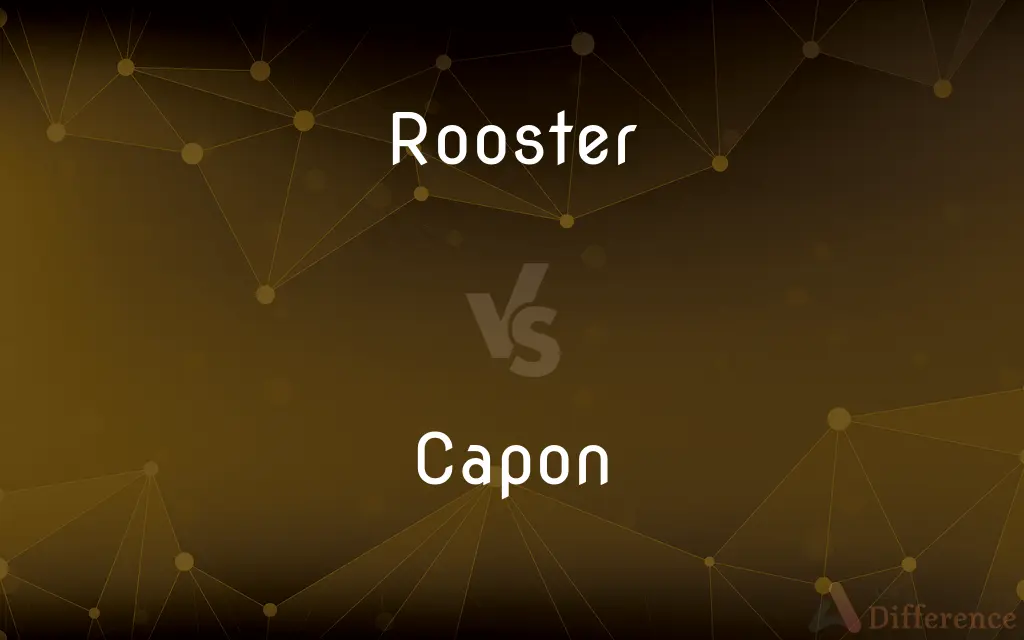Rooster vs. Capon — What's the Difference?
By Tayyaba Rehman & Fiza Rafique — Published on February 5, 2024
A rooster is an adult male chicken, while a capon is a castrated rooster, often resulting in different meat quality and behavior.

Difference Between Rooster and Capon
Table of Contents
ADVERTISEMENT
Key Differences
A rooster, known for its vibrant plumage and crowing, is a male chicken often associated with farm life and fertility symbols. In contrast, a capon is a surgically or chemically castrated rooster, known for its tender meat and docile nature, resulting from the absence of typical male chicken behaviors influenced by hormones.
While roosters play a vital role in chicken reproduction, known for their protective behavior towards the flock, capons do not engage in breeding or exhibit aggressive territorial behaviors, making them more manageable and preferred in certain culinary contexts for their meat quality.
The physical appearance of roosters is generally more striking, with longer tail feathers and brighter colors, signifying their role in attracting hens and defending territory. Capons, however, due to the castration process, lack these pronounced features and tend to have a plumper, more rounded physique, desirable in the culinary industry.
Roosters are known for their early morning crowing, a natural behavior used to assert dominance and mark territory. Capons, on the other hand, are less likely to crow or exhibit such dominant behaviors, as the hormonal changes from castration lead to a quieter and more subdued bird.
In terms of culinary use, rooster meat is often considered leaner and tougher, suitable for slow-cooking dishes. Capon meat, however, is prized for its tenderness, juiciness, and flavor, often commanding a higher price in markets due to the special rearing and processing involved.
ADVERTISEMENT
Comparison Chart
Definition
An adult male chicken
A castrated rooster, usually raised for meat
Word Origin
Old English "hrooster," related to crowing
Old French "chapon," related to caponizing process
Part of Speech
Noun
Noun
Usage in Sentences
Rooster is often used to describe a farm setting.
Capon is predominantly used in culinary contexts.
Connotation
Often symbolizes dawn or vigilance.
Implies a delicacy or a specially prepared dish.
Compare with Definitions
Rooster
Roosters play a key role in the breeding process of chickens.
The farmer relied on the rooster to ensure the continuation of his prized chicken breed.
Capon
A capon is a castrated rooster, often favored for its tender meat.
The chef prepared a roasted capon for the festive dinner.
Rooster
A rooster is a male chicken known for its crowing and colorful feathers.
The rooster crowed at dawn, signaling the start of a new day.
Capon
Despite being less common than other poultry, capons are prized in certain culinary traditions.
The gourmet restaurant specialized in dishes made from capon, attracting food connoisseurs.
Rooster
Roosters are often associated with farm life and are known for their protective nature.
The vigilant rooster guarded the henhouse from potential threats.
Capon
Capons are known for their larger size and higher fat content compared to regular chickens.
The capon, with its juicy meat, was the centerpiece of the banquet.
Rooster
In many cultures, the rooster is a symbol of fertility and awakening.
The artist depicted the rooster as a symbol of fertility in his countryside painting.
Capon
Capons are traditionally associated with luxury and special occasions due to their rich flavor.
For the holiday feast, they ordered a capon from the local farm.
Rooster
A person regarded as cocky or pugnacious.
Capon
The process of creating a capon, known as caponizing, alters the bird's hormonal balance.
Caponizing the rooster led to a milder and more docile bird.
Rooster
A male domestic chicken (Gallus gallus domesticus) or other gallinaceous bird.
Capon
A male chicken castrated when young to improve the quality of its flesh for food.
Rooster
A bird or bat which roosts or is roosting.
Capon
A cockerel which has been gelded and fattened for the table.
Rooster
An informer.
Capon
(transitive) To castrate; to make a capon of.
Rooster
A violent or disorderly person.
Capon
A castrated cock, esp. when fattened; a male chicken gelded to improve his flesh for the table.
The merry thought of a capon.
Rooster
(figuratively) A powerful, prideful, or pompous person.
Capon
To castrate; to make a capon of.
Rooster
A man.
Capon
Flesh of a castrated male chicken
Rooster
A wild violet, when used in a children's game based on cockfighting.
Capon
Castrated male chicken
Rooster
Legislation solely devised to benefit the legislators proposing it.
Rooster
The male of the domestic fowl; a cock.
Nor, when they [the Skinners and Cow Boys] wrung the neck of a rooster, did they trouble their heads whether he crowed for Congress or King George.
Rooster
Roosters are distinguished by their comb, wattles, and often more vibrant plumage than hens.
The rooster flaunted its bright feathers as it strutted across the yard.
Common Curiosities
What is a capon?
A capon is a castrated male chicken, often raised for its tender and flavorful meat.
Why are capons considered a delicacy?
Capons are considered a delicacy because of their tender, flavorful meat and the specialized process involved in raising them.
Why are roosters important on a farm?
Roosters are important for breeding, protecting the flock, and can serve as a natural alarm clock with their crowing.
What is a rooster?
A rooster is an adult male chicken known for its crowing and distinctive colorful feathers.
Can roosters be aggressive?
Yes, roosters can be aggressive as they naturally protect their territory and flock.
Can you eat a rooster?
Yes, you can eat a rooster, but the meat is leaner and tougher, making it suitable for slow-cooking dishes.
Are capons aggressive?
No, capons are generally docile due to the hormonal changes from castration.
Is capon meat more expensive than regular chicken?
Yes, capon meat is typically more expensive due to the special rearing and processing involved.
How is a capon created?
A capon is created by castrating a male chicken, usually done surgically or chemically.
Do capons lay eggs?
No, capons do not lay eggs as they are castrated male chickens.
Why do roosters crow?
Roosters crow to assert dominance, mark territory, and signal the start of a new day.
How are capons raised differently from regular chickens?
Capons are raised with more space and often for a longer period, allowing for larger size and more marbled meat.
What is the difference in taste between rooster and capon meat?
Rooster meat is leaner and tougher, while capon meat is tender, juicy, and rich in flavor.
How do you differentiate a rooster from a hen?
Roosters have longer tail feathers, more vibrant colors, and larger combs and wattles compared to hens.
What are common dishes made with capon?
Common dishes include roasted capon, capon stuffed with herbs, and capon in a creamy sauce.
Share Your Discovery

Previous Comparison
Vodka vs. Brandy
Next Comparison
Deskjet Printers vs. Laser PrintersAuthor Spotlight
Written by
Tayyaba RehmanTayyaba Rehman is a distinguished writer, currently serving as a primary contributor to askdifference.com. As a researcher in semantics and etymology, Tayyaba's passion for the complexity of languages and their distinctions has found a perfect home on the platform. Tayyaba delves into the intricacies of language, distinguishing between commonly confused words and phrases, thereby providing clarity for readers worldwide.
Co-written by
Fiza RafiqueFiza Rafique is a skilled content writer at AskDifference.com, where she meticulously refines and enhances written pieces. Drawing from her vast editorial expertise, Fiza ensures clarity, accuracy, and precision in every article. Passionate about language, she continually seeks to elevate the quality of content for readers worldwide.
















































